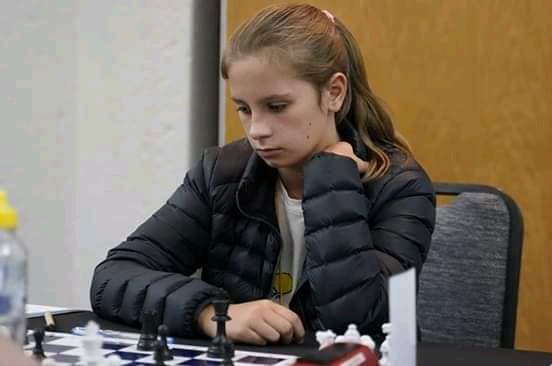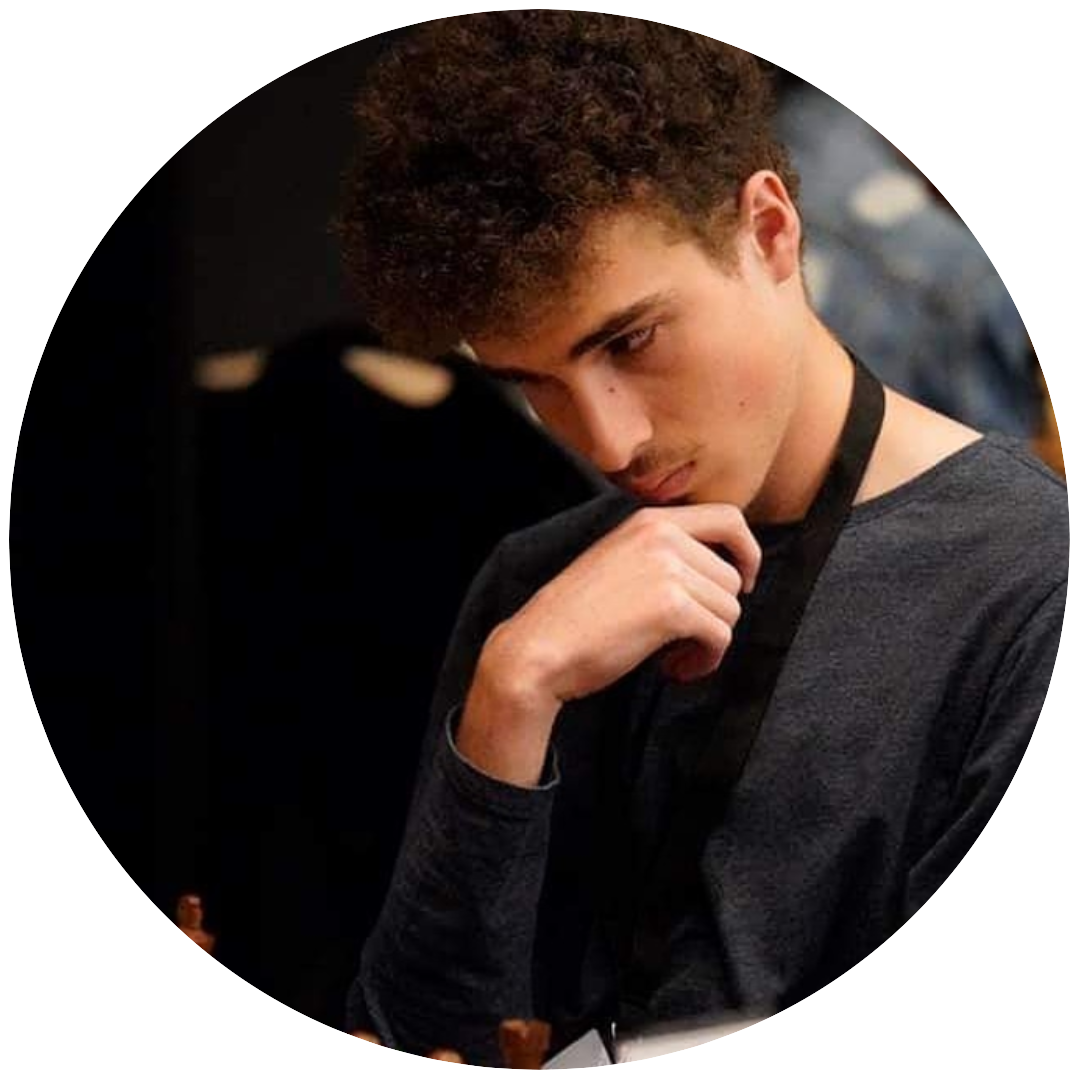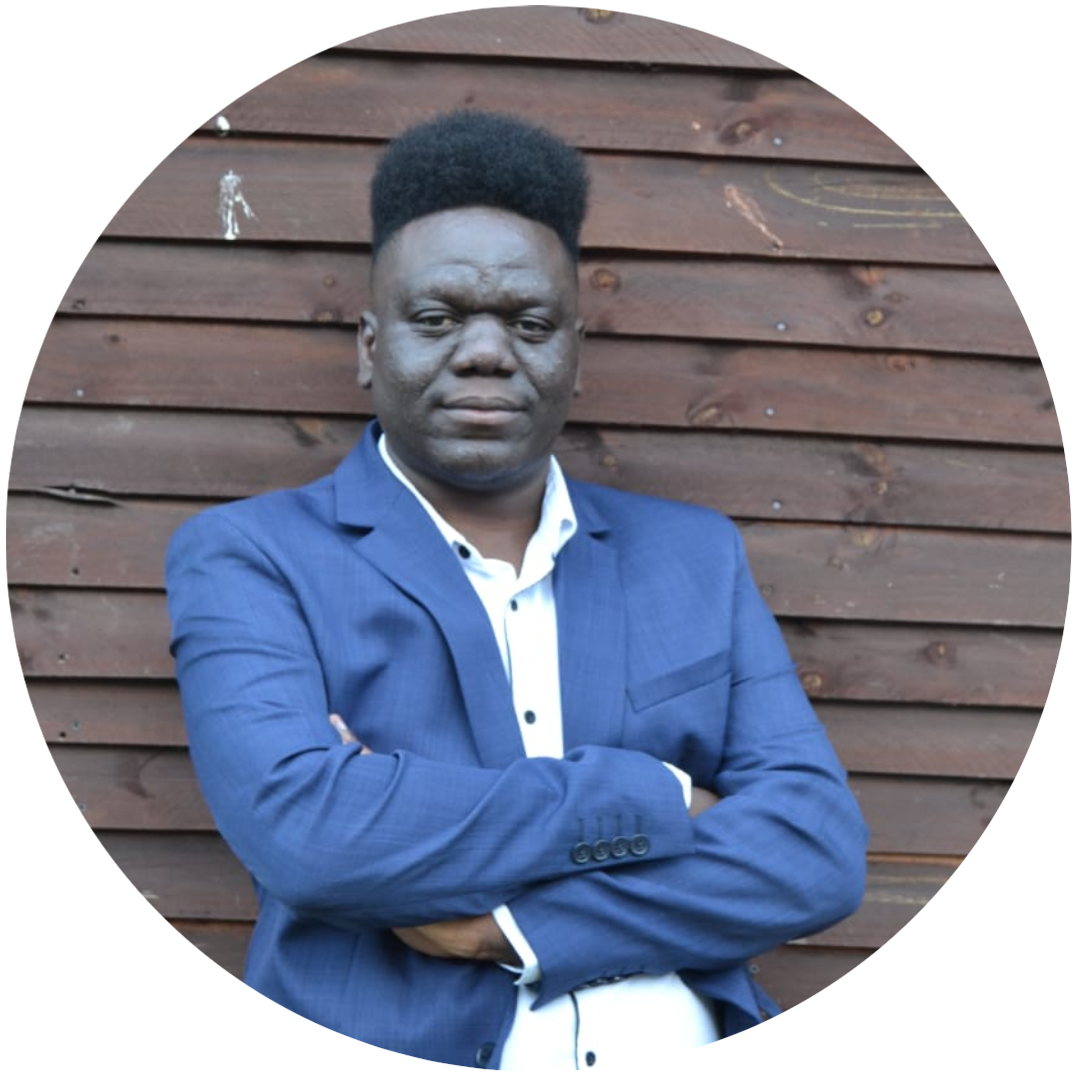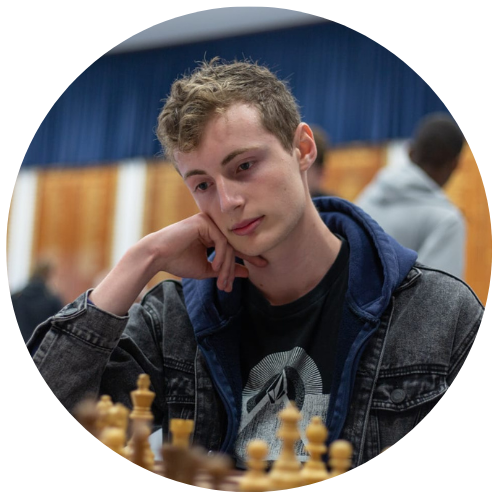FOR ANY PARENT LOOKING TO SUPERCHARGE THEIR CHILD’S “MENTAL GROWTH”…
HERE’S HOW WE HELP CHILDREN
ACCELERATE THEIR MENTAL DEVELOPMENT
IN A WAY THAT THEY ACTUALLY ENJOY!!!
(Without parents having to FORCE them, DRIVE them around, or help them with HOMEWORK…)
Watch the video below

We bring together chess players, parents, teachers, and coaches to be part of a community that enables personal growth, mental development, and social engagement based around the wonderful game of chess.

Experienced and passionate coaches.
5-star ratings on Google.
Happy students, parents, teachers, and schools.
BENEFITS OF CHESS
BENEFITS OF CHESS
Chess has been shown to improve the following in children:

- Concentration
- Pattern recognition
- Decision making
- Math ability
- Problem-solving
- Spatial reasoning
- Critical thinking
- Self-confidence
- Attention span
- Time management
- Memory capacity
- Creativity
BEST OF ALL!!!
It does this through a fun, interactive, and enjoyable game.
PROGRAMS FOR EVERY LEVEL
PROGRAMS FOR EVERY LEVEL

BEGINNER
This level covers the rules of chess, and important chess strategy every chess beginner must know.

INTERMEDIATE
This level covers powerful chess tactics and builds the skills necessary to successfully win chess games.

ADVANCED
This level covers advanced tactics, end-games, planning and strategic thinking, leading to confidence in creating a plan from any chess position.
OUR AWESOME COACHES

GM Marian Petrov

Shane Willenberg

James Allison

Michael Cuthbert

Tatenda Mushininga

Ignatius Chama

Nico Martin

Sachin Hastie

Tane Ressel

Lebohang Mphela

Alisha Chetty

Francois vd Westhuizen
TOP RATED BY STUDENTS, PARENTS & TEACHERS
“I enjoy doing puzzles with my coach especially the blindfold puzzles where you learn how to see the board in your head.”
“Coach teaches us step by step how to improve our chess.
I like it when coach makes funny jokes when we learn.”
“Elite Chess has passionate and very knowledgeable chess coaches. Their interactive lessons with the kids are practical and fun.”
“Coach Dione has improved the quality of our school teams and has been very instrumental in creating a better awareness of the sports code at our school.”
OUR CORE OFFERINGS

Chess School
Online
Our online chess school ensures students progress effectively, make friends, and have fun playing and learning chess together.
- Group Classes & Collaborative Learning
- Individual Game Analysis & Homework
- Puzzles, Courses, Videos & Tournaments
- Q/A With Expert Coaches
- Monthly GM Masterclasses & Simultaneous Games.

Chess Club
Online | At School
A light and fun extra-curricular activity for students to learn and enjoy chess together with their school friends.
- Weekly Group Coaching
- Shared Learning
- Over-The-Board Games
- Chess Puzzles
- Fun Challenges

Chess Coaching
Online | In Person
Individual coaching is essential for students who want to take their chess to the next level or compete.
- Weekly Individual Coaching
- Advanced Puzzles
- Game Analysis
- Weekly Tournaments
- Tournament Prep

Chess Tournaments
Online | In Person
Students get to use what they are learning in regular online and in-person chess tournaments.
- Weekly tournaments played online on Lichess + Chess Squad.
- Regular in-person tournaments played at partner schools.
- Kids get more confidence by playing more competitive chess.
- Students get prizes, medals, and certificates for participating.

Chess Community
Online
Players can stay connected, learn, and grow together in our vibrant and safe online community on Mighty Networks.
- Regular posts by Chess Coaches
- Fun Puzzles and Videos
- Q&A with chess coaches
- Special Chess Events
- Online Courses & Groups
- Chat with Chess Friends
- Exciting Tournaments

Chess Courses & Exams
Online | In Person
Understand strategy and tactics through in-depth online courses, and write chess exams to progress to the next level.
- Self-paced online learning
- Expert chess training by experienced coaches
- Learn concepts more in-depth
- Test your knowledge through structured exams.
- Get certified and move to the next level
REGISTER TODAY
Elite Chess Offers Incredible Value To It’s Students And Parents
Expert Coaches
Our coaches are passionate and experienced about chess and coaching. They are all highly rated chess players themselves and include Online Fide Masters and Grand Masters.
Multiple Class Options
There are a variety of class options to choose from. Students can choose the options which work best for their schedules.
Regular Chess Tournaments
We host weekly tournaments which students can participate in to test their skills and have fun together.
Collaborative Learning
Students can connect with other students, solve puzzles, join group sessions, make friends, and have fun together.
Skills Based Puzzles
Solving chess puzzles is a big part of learning chess and gaining critical thinking skills. Students will be given many skills-based puzzles to help them progress their knowledge.
Practice Work
Every student is given homework to focus on each week to help them to practically implement what they have learned in the class.
Regular Feedback
Coaches will provide very specific feedback to students with encouragements and tips on how they can improve and what they can do to take their game to the next level.
Comprehensive Reports
Every quarter, coaches will provide parents with reports on student progress, and strategic direction for future growth.
Online Community
All Elite Chess Students, Parents, and Teachers get FREE access to our safe and vibrant online chess community on Mighty Networks.
FULL Academy Membership
Students get complete access to all Elite Chess resources, including online courses, tournaments, online community, videos, and any other resources our coaches produce.
Frequently Asked Questions
Chess Academy
Do I have to know how to play chess to be coached by ELITE?
All you need is the desire to learn and have the willingness to work hard. We will coach a player at any level and help you grow and reach your chess potential in no time.
What guarantee do I have that I will improve?
Your chess skills and rating will improve! Check our testimonies from our students. But, if after 4 lessons you feel that your chess has not improved we will give you back 100% of what you have invested.
Why an elite chess coach?
Most chess coaches focus on results, like wining or losing. But we focus on the root problems causing you not to improve. This makes my coaching effective and fun. Every chess player wants to stop making the same mistakes. Our coaching focuses how to best equip you to become a better chess player.
How do I ask questions if I don’t understand the chess lessons?
Ask during the lesson or any time you want. Our coaching style is very interactive and we care more about you understanding the lessons than anything else.
Can you help me with chess tournaments?
We can come to the chess tournament to help you to prepare for the games against your opponents. We can also help you with preparation for the chess tournament; game analysis of opponents and good advice to follow during the tournament.
What hours are you available for coaching, online or in person?
We are available for coaching online, Monday – Friday 8:30am – 6pm. And coaching in person, Monday – Friday 8:30am – 5pm.
How do I know I am safe meeting you for face-to-face coaching?
We have worked for schools, provincial teams and chess clubs. We are professional and take our coaching seriously. If you are under the age of 18 we recommend that a parent or guardian joins you for the first lesson. They are also welcome to contact us any time. You are also welcome to start with an online lesson and then progress to in person lessons at a later point if you wish. If you want to meet us first you can schedule a free 20 min meet up here.
Is my data safe on your website?
Yes. Your data is perfectly and protected by our Privacy Policy.
Who is the Elite Chess Academy for?
The academy s for anyone willing to learn the game of chess as a fun activity, make friends, or to take part in competitive Chess.
What are the levels of classes that are available?
There are 3 levels – Beginner, Intermediate, and Advanced. In the Beginner level, we teach the basics of chess, in the Intermediate level we teach Chess tactics and more…and in the Advanced level, we teach various Chess Strategies for the students to take their game to the next level.
What is the duration of each coaching class?
Each coaching class is 1 hour.
Is there a curriculum?
Yes, we do follow the curriculum for each of the levels. Please click on the “view Curriculum” buttons below each level above to see more.
How do I schedule a makeup lesson?
Our online group classes have multiple options to pick from. If you miss one class, you can come to any of the classes that are happening on other days. Individual coaching students can book a make-up session with their coach.
Can I pick my coach?
We assign a coach to you. If you like the coach you can continue with them. If not, we will assign a different coach to you.
What are the prices of each level of classes?
You can contact us to view our rates. Alternatively, after you register you will see all the options and rates.
What is the minimum age to be a student?
5 years or older.
How do I know which class should I opt for?
If you do not know chess, you will be at the Beginner level. If you already know chess, then we will assess where you stand and let you know which class you should opt for.
How many classes do you have per month?
At all levels, we will have 4 hours of coaching classes per month and upto 16 hours of optional practice sessions every month.
How soon can I join?
Once you’ve registered, we will let you know of your class start date. Usually happens within the first 10 days of registration or as part of a new batch, whichever is earlier.
Do you give homework?
Yes, this will depend on the level where you join. Beginners tend to have less homework and those in Intermediate & Advanced levels will have more complex homework/ puzzles to solve.
What if I miss a class?
If you miss a class, we will have options for you to do make up lessons.
Who are your coaches?
Our coaches come with years of experience in Coaching. Some of our coaches have played at the national levels too. We also have a Grand Master coach on board who will teach Advanced lessons, online.
What are practice classes?
Practice Classes have been designed to provide a free atmosphere for students to play against each other, discuss and/or collaboratively solve puzzles.
FREE Online Community
Why a Free online chess community?
Our goal is to make chess fun, safe, and accessible to all. An online community helps us reach many more people with the wonderful game of chess.
What happens in the online community?
Through our online community we host regular tournaments, special workshops, unique live broadcasts, chess clinics, chess camps, and even chess exams.
Why join the online community?
By joining the community you can stay up to date with what is going in the academy and in the world of chess.
You can also join your local group, bookmark upcoming events, and connect with fellow students, parents, coaches, and teachers.
How safe is the online community?
To ensure the safety of all members, the community is hightly regulated and all members are strictly vetted before being permitted to join.
Only registered academy members, parents of academy students, teachers from partner schools, and our coaches have access to the community.
Chess Club
Who can join chess club?
Students who attend a partner school can join the weekly sessions hosted by one of our expert chess coaches.
What about students who do not live close to or attend a partner school?
Students who do not live close to a partner school are welcome to join our online chess school for weekly group sessions with other online chess academy members.
What are the benefits of chess club?
Students will be able to learn together, ask the coach questions, play games against one another, and get real-time coaching and tips from the coach. Students also get awarded for their progress to encourage them to stay engaged and growing.
Individual Chess Coaching
How often do students meet with coaches?
Students meet with their coach every week for 1 hour (at home or via Zoom).
What happens during the coaching sessions?
Students will receive a short lesson based on their growth plan, complete puzzles, and play training games with the coach.
Throughout the session, the coach will provide students with focused individual support and training based on their level and progress.
What else do coaches assist students with?
Coaches will also help students prepare for upcoming tournaments and work on specific areas of weakness based on the analysis of their recent chess games.
How do I know my child is actually improving?
Parents receive a quarterly report of the student’s progress and can meet with the coach online to discuss work for the next term.
Online Chess School
How do students access the online school?
Students use a home computer, smartphone or tablet to progress through our online curriculum by doing puzzles, learning tactics, watching videos, and playing online games on Lichess (a free online chess app).
How are students’ progress tracked?
A student’s progress is analysed via Lichess (for starter and regular students), and using cutting-edge AI technology through our partner app “Aim Chess” (for premium students).
How do the coaches assist students?
Our expert coaches monitor each student’s progress and then touch base with students via the community’s chat messenger to encourage them, and give them feedback and direction.
How does the coaching work?
Students join the weekly live sessions with their coach, attend online workshops, and play in weekly tournaments.
Students can reach out to their coach anytime via the community chat function to get assistance.
Parents can track their child’s progress through the Lichess or Aim Chess apps and can get in touch with the coach anytime via the community platform or email.


Chat with May
Chat with May anytime via the chat bubble.
Beginners’ level 1 course
Lesson plans (3 months) (12 lessons)
0 – 1000 Chess South Africa rating
At the end of this course the student is expected:
- To have a consistent Lichess/chess.com rapid rating of 1100.
- Explain and show what is en passant, check, stalemate, and checkmate.
- Played over 20 rapid chess games online Lichess/Chess.com
If the student is successful in all these points they win a chess certificate from Elite Chess Academy.
Lesson 1:
Introduction to the royal game of chess.
- What is your goal in chess? Why do you want to get chess coaching? How much time are you willing to commit to chess?
- What is chess? And the goal of the chess game?
- History of chess? And the origin of chess.
- The benefits of chess?
- Learn about the chessboard
- Practice and skill exercises to master the lesson goals.
Lesson 2:
Basic rules of chess
- The chess pieces (RBQKNP preferred order)
- Mini chess games to master the movement and capturing of the pieces
- The points/value of pieces
- Practice and skill exercises to master the lesson goals.
Lesson 3:
Important chess terms
- What is check?
- What is checkmate?
- What is stalemate?
- How to avoid stalemate
- Practice and skill exercises to master the lesson goals.
Lesson 4:
Special rules in chess
- Learn about castling?
- Capturing en passant/ in passing/by passing.
- What is perpetual check?
- Practice and skill exercises to master the lesson goals.
Lesson 5:
How a game of chess can end
- The 3 results in chess (win, lose and draw)
- 6 ways to draw a chess game
- Why we lose chess games?
- There is no shame in losing at chess.
- Learning from our loses
- Practice and skill exercises to master the lesson goals.
Lesson 6:
How to write down your moves
- Chess notation
- Why it is important to write down your moves?
- 3 stages/phases in the game of chess: Opening, Middlegame and Endgame
- Practice and skill exercises to master the lesson goals.
Lesson 7:
Basic checkmates
- King and Queen vs King checkmate
- King and Rook vs King checkmate
- King, Queen and Rook vs King checkmate
- King and two rooks vs King checkmate
- King and two bishops vs King checkmate
- Back rank checkmate
- Smothered mate
- Show how all the pieces can checkmate the King
- Practice and skill exercises to master the lesson goals.
Lesson 8:
The most important principles in the Opening
- Controlling the centre
- Development rules
- King safety
- Practice and skill exercises to master the lesson goals.
Lesson 9:
Attack and Defence in chess
- Attacking in chess
- Defending in chess
- Practice and skill exercises to master the lesson goals.
Lesson 10:
Understand your pieces
- Strengths of chess pieces
- Weaknesses of chess pieces
- Preparing for your first chess tournament
- Practice and skill exercises to master the lesson goals.
Lesson 11:
Common traps in chess
- Fools mate
- Scholars mate
- Basic chess traps to know
- Practice and skill exercises to master the lesson goals.
Lesson 12:
The mindset of a chess player
- Chess as a sport
- Chess psychology
- Sportsmanship in chess
- The importance of hard work and commitment.
- Practice and skill exercises to master the lesson goals.
Beginners’ level 2 course
Lesson plans (3 months) (12 lessons)
0 – 1000 Chess South Africa rating
At the end of this course the student is expected:
- To have a consistent Lichess/chess.com rapid rating of 1400.
- Explain and show what is a fork, pin and skewer.
- Name all the male and female World Chess Champions.
- Played over 40 rapid chess games online Lichess/Chess.com
If the student is successful in all these points they win a chess certificate from Elite Chess Academy.
Lesson 1:
Development principles
- Knights and Bishops
- Rooks and Queen
- Castling
- Practice and skill exercises to master the lesson goals.
Lesson 2:
King Safety
- The weakness of f2/f7 square
- Same side castling
- Opposite side castling
- Practice and skill exercises to master the lesson goals.
Lesson 3:
The centre
- What is it?
- Why is it important
- How should you fight for it?
- How it helps you gain space and mobility
- Practice and skill exercises to master the lesson goals.
Lesson 4:
Chess openings
- Good chess openings
- Bad chess openings
- No opening wins or loses chess games
- Names of some popular chess openings
- Practice and skill to master the lesson goals
Lesson 5:
Strategy and attacking
- What is strategy?
- What is the attack in chess?
- The teamwork of strategy and attacking.
- Practice and skill exercises to master the lesson goals.
Lesson 6:
Targets in chess
- Finding targets to attack
- The King is the first target to attack
- Pieces and Pawns are the second target to attack
- A weak square is the third target to attack
- Practice and skill exercises to master the lesson goals.
Lesson 7:
How to think like a strong player
- Learn the right way to think in chess. After every move by your opponent, ask yourself these questions
- Can I take any of my opponent’s pieces to get more pieces than them?
- What does my opponent want to do?
- Before making your move, ask yourself is my move a blunder?
- Practice and skill exercises to master the lesson goals.
Lesson 8:
Tactics
- What are chess tactics?
- Forks
- Pins
- Skewers
- Practice and skill exercises to master the lesson goals.
Lesson 9:
Chess culture
- Learn more details about the history of chess
- Learn about all the world chess champions.
- Learn about the International Chess Federation (FIDE)
- Practice and skill exercises to master the lesson goals
Lesson 10:
How to study an opening part 1
- Learn a classical way to play against 1.e4
- The Ruy Lopez/ Spanish Game and the Italian Game/ Giuco piano
- Practice and skill exercises to master the lesson goals.
Lesson 11:
How to study an opening part 2
- Learn a classical way to play against 1.d4
- Learn the Queens Gambit Declined and the Slav Defense
- Practice and skill exercises to master the lesson goals.
Lesson 12:
Victory comes with much planning
- How to prepare for a chess tournament
- How to use the chess clock wisely.
- How to practice the habit of not getting into time pressure.
- Physical fitness for the chess tournament.
Intermediate level 1 course
Lesson plans (5 months) (20 lessons)
1000 – 1400 Chess South Africa rating
At the end of this course the student is expected:
- To have a consistent Lichess/chess.com rapid rating of 1700.
- Explain and show how to attack the King in the center, castled on the kingside and castled on the queenside.
- Analysed all the games played in the first World Chess Championship match and write down a summary of the instructive things they learnt.
- Played over 60 rapid chess games online on Lichess/Chess.com
If the student is successful in all these points they win a chess certificate from Elite Chess Academy.
Lesson 1:
Tactical patterns
- Double and discovered check
- Discovered attack
- The windmill
- Practice and skill exercises to master the lesson goals.
Lesson 2:
Tactical patterns
- Removing the guard
- Perpetual check
- Practice and skill exercises to master the lesson goals.
Lesson 3:
Tactical patterns
- Pawn promotion
- Deflection and Decoy
- Practice and skill exercises to master the lesson goals.
Lesson 4:
Tactical patterns
- Line clearance
- Square clearance
- Practice and skill exercises to master the lesson goals.
Lesson 5:
Tactical patterns
- Zugzwang/ forced losing move and Zwischenzug/in between
- Overloading
- Practice and skill exercise to master the lesson goals.
Lesson 6:
Chess endings principles
- Pawn endings
- Pawn endings require accurate calculation
- King and pawn vs King
- Practice and skill exercises to master the lesson goals.
Lesson 7:
Chess endings principles
- Rook endings
- Rook belong behind passed pawns
- Rook belong on opponent’s 7th rank
- Kind and rook vs King and pawns
- Practice and skill exercises to master the lesson goals.
Lesson 8:
Chess endings principles
- Knight endings
- Knights are slow in endings
- King and Knight vs King and pawns
- Practice and skill exercises to master the lesson goals.
Lesson 9:
Chess endings principles
- Bishop endings
- Bishop usually increase in power in endings
- King and Bishop vs King and pawns
- Practice and skill exercises to master the lesson goals.
Lesson 10:
Chess endings principles
- Queen endings
- Queen want to be centralized in endings
- King and Queen vs King and pawns
- Practice and skill exercise to master the lesson goals.
Lesson 11:
Chess endings principles
- Training the basic technique to use in chess endings
- The golden rules of chess endings
- Practice and skill exercises to master the lesson goals.
Lesson 12:
Basic planning in chess
- Attack on the King in the center
- Attack on the King on the kingside
- Attack on the King on the queenside
- Practice and skill exercises to master the lesson goals.
Lesson 13:
Basic planning in chess
- Queenside attack of the opponent’s weaknesses (e.g. weak pawns and squares)
- Pawn islands
- Practice and skill to master the lesson goals.
Lesson 14:
Basic planning in chess
- Central play
- Occupying the center
- Practice and skill to master the lesson goals.
Lesson 15:
Bishop pair
- The advantage of the Bishop pair
- How to use open lines and diagonals
- Practice and skill to master the lesson goals
Lesson 16:
Weaknesses in chess
- How to attack weak squares
- How to attack weak pawns
- Practice and skill to master the lesson goals.
Lesson 17:
Piece placement
- Good and bad pieces.
- Best position to put your pieces.
- The outpost
- Practice and skill to master the lesson goals.
Lesson 18:
Checkmating patterns
- Damiano’s mate
- Lolli’s mate
- Practice and skill to master the lesson goals.
Lesson 19:
Analysing your chess games
- How to analyse your chess games
- Why you should analyse your chess games
- Practice and skill to master the lesson goals.
Lesson 20:
Classical chess games
- Learning from classical chess games
- How to analyse instructive classical chess games.
- Why it is important to learn from classical chess games.
Intermediate level 2 course
Lesson plans (5 months) (20 lessons)
1000 – 1400 Chess South Africa rating
At the end of this course the student is expected:
- To have a consistent Lichess/chess.com rapid rating of 1900.
- Explain and show how to play in the Carlsbad pawn structure with the White pieces and with the Black pieces.
- Analysed all the games played in the second World Chess Championship match and write down a summary of the instructive things they learnt.
- Played over 100 rapid chess games online on Lichess/Chess.com
If the student is successful in all these points they win a chess certificate from Elite Chess Academy.
Lesson 1:
Pawn structures
- Isolated pawns
- Practice and skill to master the lesson goals.
Lesson 2:
Pawn structures
- The Doubled pawns
- Practice and skill to master the lesson goals.
Lesson 3:
Pawn structures
- The backward pawn
- Practice and skill to master the lesson goals.
Lesson 4:
Pawn structures
- The hanging pawns
- Practice and skill to master the lesson goals.
Lesson 5:
Pawn structures
- The passed pawn
- Practice and skill to master the lesson goals.
Lesson 6:
Pawn structures
- The pawn majority and pawn minority
- Practice and skill to master the lesson goals.
Lesson 7:
Pawn structures
- The Carlsbad Pawn Structure
- Practice and skill to master the lesson goals.
Lesson 8:
Middlegame strategy
- The exchange sacrifice
- Practice and skill to master the lesson goals.
Lesson 9:
Middlegame strategy
- The positional sacrifice
- Practice and skill to master the lesson goals.
Lesson 10:
Middlegame strategy
- The Greek gift sacrifice
- Practice and skill to master the lesson goals.
Lesson 11:
Middlegame strategy
- Attacking with opposite colour bishops
- Practice and skill to master the lesson goals.
Lesson 12:
Middlegame strategy
- Good bishop vs bad Knight
- Good Knight vs bad Bishop
- Practice and skill to master the lesson goals.
Lesson 13:
Middlegame strategy
- Rook vs minor piece
- Practice and skill to master the lesson goals.
Lesson 14:
Basic plans in openings
- The French defense
- Practice and skill to master the lesson goals
Lesson 15:
Basic plans in openings
- The Italian game
- Practice and skill to master the lesson goals
Lesson 16:
Basic plans in openings
- Caro Kann defense
- Practice and skill to master the lesson goals
Lesson 17:
Basic plans in openings
- The Sicilian defense
- Practice and skill to master the lesson goals
Lesson 18:
Endgame thinking process
- How to think in chess endgames
- Tactical chess endings
- Strategic chess endings
- Practice and skill to master the lesson goals
Lesson 19:
Practical chess endings
- How to play practical chess endings
- Studying practical endings from Grandmaster games
- Practice and skill to master the lesson goals
Lesson 20:
Rook ending
- Rook vs Minor pieces endings
- Practice and skill to master the lesson goals
Advanced level 1 course
Lesson plans (6 months) (24 lessons)
1400 – 1800 Chess South Africa rating
At the end of this course the student is expected:
- To have a consistent Lichess/chess.com rapid rating of 1900.
- Explain and show how to play in the Carlsbad pawn structure with the White pieces and with the Black pieces.
- Analysed all the games played in the second World Chess Championship match and write down a summary of the instructive things they learnt.
- Played over 100 rapid chess games online on Lichess/Chess.com
If the student is successful in all these points they win a chess certificate from Elite Chess Academy.
Lesson 1:
Prophylactic thinking
- Basic prophylactic thinking
- Basic prophylactic thinking of preventing tactical threats of the opponent.
- Basic prophylactic thinking of preventing positional threats of the opponent.
- Practice and skill to master the lesson goals
Lesson 2:
Art of defending in chess
- Start by believing you can defend the position
- Find counter play to distract your opponent from attacking you.
- Simplify the position by exchanging the attacking pieces of your opponent
- Give material back to get a good position
- Attack with maximum pieces but defend with minimum pieces.
- Practice and skill to master the lesson goals
Lesson 3:
Drawing combinations
- Stalemating combinations
- Perpetual check
- Repetition of moves
- Creating a fortress
- Practice and skill to master the lesson goals
Lesson 4:
Elimination method of calculation when defending
- Eliminate all the bad moves and play the only move that doesn’t lose immediately.
- Practice and skill to master the lesson goals
Lesson 5:
Comparison method in calculation
- Compare between two similar moves when you’re calculating to choose the best one.
- Practice and skill to master the lesson goals
Lesson 6:
Technique of calculating variations in chess
- Selecting Candidate moves
- When defending make use of the Elimination Method of calculation.
- When not sure between two moves that both look good use the comparison method when calculating.
- Make an objective evaluation/judgment of the final position when you calculate every variation.
- Practice and skill to master the lesson goals
Lesson 7:
King and pawn endings
- King and two healthy pawns vs lone King
- Tactical breaks to watch out for
- Triangulation
- Outflanking
- Practice and skill to master the lesson goals
Lesson 8:
Rook endings
- Rook and two connect pawns vs Rook
- Rooks belong on the 7th rank
- Practice and skill to master the lesson goals
Lesson 9:
Queen endings
- Queen vs pawns
- Queen vs Queen no pawns
- Queen vs Queen with pawns
- Practice and skill to master the lesson goals
Lesson 10:
Knight endings:
- Knight vs pawns
- Knight vs 2 or 3 pawns
- Knight and pawn vs King
- Practice and skill to master the lesson goals
Lesson 11:
Bishop endings:
- Bishop vs pawns
- Fortresses
- Bishop vs wrong pawn
- When pawns are on one side
- The principle of one diagonal
- Practice and skill to master the lesson goals
Lesson 12:
Combinations involving the back rank
- Weakness of the back rank
- Deflection
- Common bank rank patterns
- Practice and skill to master the lesson goals
Lesson 13:
Checkmating combinations
- Checkmate along files and diagonals
- Anastasia’s checkmate
- The Arabian checkmate
- The Queen and Bishop battery
- The Queen and Rook battery
- Boden’s checkmate
- Practice and skill to master the lesson goals
Lesson 14:
Checkmating combinations 2
- The Legal’s checkmate
- Damiano’s checkmate
- Lolli’s checkmate
- Greco’s checkmate
- Blackburne’s checkmate
- Pillsbury’s checkmate
- Smothered checkmate
- Practice and skill to master the lesson goals
Lesson 15:
Taking advantage of opponent’s weaknesses
- What is a weakness?
- Force your opponent to create weakness and occupy them with your pieces
- Occupy the weaknesses around a castled King and use them to attack the opponent’s King.
- Look for a weak point in the opponent’s position and attack it!
- Practice and skill to master the lesson goals
Lesson 16:
Principles of attacking the King
- You need to understand tactics very well
- You need to attack with all your pieces
- You need make sure your opponent has weaknesses you can exploit around their King before you attack.
- You need to have better development of pieces
- You need to avoid premature attacks
- You need to remain positive and believe that your attack will succeed because if you doubt you will make bad moves.
- Practice and skill to master the lesson goals
Lesson 17:
Attacking the castled King
- Sacrificing on h6
- Sacrificing on f6
- Sacrificing on h7
- Sacrificing on g7
- Practice and skill to master the lesson goals
Lesson 18:
Attacking the fianchetto position
- Aim to exchange the fianchetto bishop and attack the weakness it leaves behind
- Advance the rook pawn to open up the h-file (a-file) and use the open file to bring major pieces in the attack.
- Practice and skill to master the lesson goals
Lesson 19:
How to get an advantage in the opening
- Rapid development
- Fight for control of the centre
- Stop your opponent’s ideas to develop and control the centre
- Play openings with pawn structures that you know
- Fight for the initiative
- Go into a middlegame knowing the basic plans of the opening you play
- Practice and skill to master the lesson goals
Lesson 20:
Opposite colour bishops
- High drawing chances, even being down with one or two pawns
- Put your pawns on the same squares as the opponent’s bishop when attacking
- Put your pawns on the same squares as your bishop when defending
- The main idea is to create a fortress when defending
- Use the principle of the single diagonal when defending your own pawns and stopping the opponent’s pawn from crossing over that diagonal
- Attack the opponent’s pawn to cause them to move forward and blockade them on a diagonal.
- Practice and skill to master the lesson goals
Lesson 21:
Open positions
Lesson 22:
Closed positions
Lesson 23:
Open files
- What is an open file
- How to control an open file
- What to do when your opponent is the one in control of an open file
- Which pieces should you use to control and open file.
- How to win chess games by dominating the only open file on the chess board.
- Practice and skill to master the lesson goals
Lesson 24:
Open diagonal
- What is an open diagonal
- How to control it
- How to fight for it when your opponent is controlling it.
- Which pieces should you use to control it
- How to win a chess game by dominating an open diagonal.
- Practice and skill to master the lesson goals

Michael Cuthbert
Why I love chess
Chess is a game with unlimited opportunities. When I play chess I feel like I’m in control and whatever happens on the board is a direct result of how hard I’ve trained and how much I focus. Every other game I’ve played gets frustrating after a while as luck and other factors affect my success, but I don’t feel that way with chess. Chess is the one game I can play over and over again and still feel like it’s a new experience. The more I learn about chess the more I realize how little I know.
Why I love coaching chess
I’ve been coaching chess for nearly 4 years now and the people I’ve met have had a large impact on me as a person. It always excites me to work with people who are passionate about the game and helping people achieve their goals brings a lot of joy to me.
My coaching style
My coaching style differs depending on the student. Some students require more of a gentle touch whereas others need a more rigid environment to thrive. I am big believer in the Dutch steps method for beginner to intermediate players as it offers a methodical approach which helps build a strong chess foundation.
For intermediate to advanced students I like using Artur Yusupov’s training course as a reference because the comprehensive nature of the course will help any player round off their chess. I also try to use my experience to help identify player’s weaknesses and help them find ways to improve that. Self-study is a vital part of chess improvement and I try to provide all of my students with all the tools they need to improve by themselves.
My desire for my students
My goal for my students is to help them achieve whatever goals they have. If the student does not have specific goals I will help them set measurable goals and achieve them. I believe chess should be a fun activity and I do my best to promote this as in my experience the students who enjoy chess most are the ones who will succeed.
Message to students, parents, and teachers
There are numerous studies on the benefits of chess. Improved concentration, creativity and better memory are just a few of the upsides. I’ve seen enough people (kids specifically) mature and grow as they improve their chess skills that I think it’s very good for any child to learn chess.

Francois van der Westhuizen
Why I love chess
It is the feeling of making a great move after a mistake, the joy of the fight against someone who loves the game as much as you, the look and feel of an expertly crafted chess set. My love for chess is as simple and complicated as the move of a pawn.
What I love about coaching Chess
Teaching chess is not as easy as it seems, there are many factors that go into its success and I love all of it. Having your student go from moving randomly in the opening to having a repertoire is a great feeling. Even better is the excitement of winning against an opponent they had problems with for months or years. But my greatest love is when a student picks up a bit of that chess passion and starts talking about Morphy and Tal and asked if I saw the latest Magnus game.
My coaching style
I adapt to each person. Everybody has different strengths and weaknesses and I take time over the course of the year to address each student. Everyone thinks differently about moves and positions and I believe that everybody should have a chance to be heard and corrected if wrong. Growth in any subject is a two way street.
My desire for my students
I want each and everyone of my students to walk away with a deeper understanding of chess. Even if it just surface level knowledge. Not every student will be a chess fanatic but I believe everyone can love the game if they have the right teacher.

Tatenda Mushininga
Why I love chess
I cannot have enough of the thrills I have during a game, mostly of suspense, action and mystery. Although occasionally drama and comedy. Then every one I am sure, like me, will attest that some games are just plain Survivor Series and horror stories. All this is the entertainment chess brings, entertainment with discipline and focus cultivated, a rare sport.
Why I love coaching chess
I have a motto I live by. LIVE. LEARN. EVOLVE. I can only live by it if I share what I have and that automatically pushes me to evolve. I love the process of replicating my years of learning in my students in a few lessons. I teach others so that together we evolve up the chess ladder.
My coaching style
I teach how to think, how to see, and how to analyse. I have countless examples of students whom I taught from having no chess knowledge to becoming national finalists and gold medalists within a month or two of training. I don’t believe in teaching opening traps, I want my students to know what to do at each point of the game whether new or theoretical.
My desire for my students
My greatest desire is for my students to be able to finally play like titled players with ease in no time.
Message for students, parents, and teachers
Chess teaches discipline, smartness and critical thinking. Kids are thus captured from a tender age and discipline is instilled in them. Analysis and the ability to take responsibility for every move one makes in life, the ability to sacrifice one advantage for another, like material for time to win…. kids are taught currencies of real life by this and thus become smarter than their contemporary classmates.
Whatever your age, chess will teach you to be a better person. It will not only sharpen your brain and save your brain from aging too quickly, but it’s a whole new world of entertainment full of feelings and memories that is much better than video games and TV .

Nico Martin
Why I love chess
Through chess I have gotten the opportunity to travel to different provinces and even other countries. I love chess because of the unique positions and struggles that each game brings to the table. Although the rules are relatively simple, they create a game that is beautifully complex. There is always something new to learn in chess. Each game is a battle of the minds – based on skill not luck.
Why I love coaching chess
Sharing my passion for the game and helping others to achieve their goals. Others in the chess community helped me to improve so now it is time for me to pass on the chess knowledge that I have gained over the years.
My coaching style
I’m more of a tactical player by nature and enjoy playing dynamic positions. I mainly place an emphasis on knowing the middle game plans combined with concrete endgame knowledge. Every chess player is different, but I will try to identify each student’s weaknesses and work to eliminate them.
My desire for my students
Most importantly I want my students to have fun and enjoy themselves. To be hard working and be willing to put the effort in in order to improve. It is also important to be eager to learn new things and be in a fighting mood over the chessboard.
Why you think it’s important for kids to play chess?
Science has proven through a multitude of studies that chess is a game of many benefits including: increasing concentration, teaches visualisation and planning ahead, improves creativity through problem solving and helps develop logical thinking skills.
Message for students, parents, and teachers
Losses can be painful, but in the words of Henry Ford “The only real mistake is the one from which we learn nothing.” Mistakes are the pathway to improvement and fixing them allow you to move on to the next level.

GM Marian Petrov
Why I love chess
For me, this is my life. I have started from a young age and most of my friends and important people who I met were because of chess.
It helped me to visit many countries around the world, to win many trophies and titles. Improved my overall knowledge of the world because of traveling and meeting people from all over the world.
Why I love coaching chess
I actually have studied 5 years and got a bachelor’s degree in our National Sports Academy. So I was preparing for this when I was younger and already have over 20 years of experience. It helps me again to meet even virtually many people from different countries. Everyone has a different level but I like to help them to improve their level.
My coaching style
It depends on the level of the student. For beginners, I try to teach them the most important basic things but above all to try to understand every move they make. For more advanced players to improve the areas where they are struggling and to use the strongest part of their game.
My desire for my students
The most important is to enjoy the game. They can have different goals. Simply to learn the game, or to try to understand it better or even to master it. If they want to commit more I wish they become good players, travel around the world and win tournaments. Then to try to make a career by playing or later with coaching.

Ignatius Chama
Why I love chess
I Love chess because I find joy in playing the Game. When I play chess it opens my eyes to new possibilities, it helps me come up with good plans and strategies. Which I can focus on and find different ways to execute and implement. Also the fact that it’s Mind games and tactics.
Why I love coaching chess
I love coaching chess because it opens the mind to new ways of thinking. When someone is facing a challenge chess can help you plan or think of a solution to the problem.
My coaching style
My style of coaching will differ depending on the student or person and what they know. I can take them from beginner to advanced with time.
My desire for my students
My desire is for students to realize the endless possibilities and ways they can achieve their goals weather in chess or life in general.
Why I think it’s important for kids to play chess
Kids should play chess because it helps with coming up with ideas and critical thinking.

Sachin Hastie
Why I love chess
Chess has taught me many invaluable lessons. I have learnt the importance of respect and to never undermine the ability of yourself or that of others. It is a game for all to enjoy – it does not discriminate. I love chess as it rewards patience, persistence and hard work. There are billions of variations that can be played and thus there is something new to be learnt in every game.
Why I love coaching chess
I have a love for all things related to chess. As such I get excited when others show an interest in the game and are wanting to know more. I also love seeing growth. And to me it is a privilege to be a part of someone’s development.
My coaching style
My focus is on the player’s ability to develop a plan and to improve their positional understanding and strategical play as this will ensure sound reasoning behind each move. I appreciate tactical play and awareness and its fundamentality in all games thus tactical themes is important in coaching. The endgame is a struggle at all levels of chess thus I focus on developing an understanding of endgame themes and memory of the basics.
My desire for my students
To develop a teachable spirit and a growth mindset. To celebrate the wins and appreciate the lessons that come with losing. The student should stretch themselves and reach their potential all while having fun and enjoying the game.
Why I think it’s important for kids to play chess
It improves kids’ ability to concentrate and hold large amounts of information. It helps them to think critically and not rush when making decisions. Chess players are great people and kids will make lifelong friends at tournaments and school.

Shane Willenberg
Why I love chess
I love chess as a sport because it keeps my mind active and captivated even when I’m not sitting in front of the board I’m able to work through games and variations. Chess has been a lifestyle for me from a very young age. The game has naturally allowed me to be a logical, critical thinker who is calm in all kinds of pressure situations. Chess has allowed me to become a leader, and I think it’s because chess teaches one to have a sense of ownership and responsibility because if I were to make a mistake over the board it’s on me.
Why I love coaching chess
I enjoy imparting my chess knowledge to others, especially kids as it is a real joy to see them improve and become strong players.
My coaching style
In general, my coaching style is to help my students work on their weak points so that when they encounter certain positions they will be more comfortable making strong, accurate moves.
My desire for my students
My desire for my students is to play chess and enjoy the game for its strategic artistry, complexity and beauty.
Why I think it’s important for kids to play chess
Chess is good for developing minds and enhancing critical thinking. Lessons learnt in chess can also be used in school which might help kids grasp certain academic concepts faster. Chess also helps kids perform under pressure and improves mental fortitude.
Message to students, parents, or teachers
Professional chess coaching will place your child ahead above the rest. Their ratings will improve and they will be motivated to win tournaments, earn chess master titles and become ELITE CHESS PLAYERS.

Tane Ressel
Why I love chess
I love chess for so many reasons, from the thrill of a time scramble to the elegance of a creative positional manoeuvre to the amazing friends I’ve made at tournaments. It’s a game of endless possibilities that reveals new secrets whenever I look.
Why I love coaching chess
Seeing students mature into strong players is one of the best feelings in the world, second only to seeing them develop a love for chess. I was lucky enough to have some excellent mentors early in my chess journey, who helped to shape me into the player I am today. Now I’m honoured to have the opportunity to do the same for others!
My coaching style
The most important thing by far is that the student enjoys themselves. Ultimately, we play for enjoyment – to lose sight of that is to turn play into work, and fun into a chore. No one ever improves without loving chess, so I aim at every step to instil a passion for the game! Each student has their own strengths, weaknesses and personality, so I always customise the syllabus to some extent while still making sure to teach the indispensable skills that every player needs.
My desire for my students
I want my students to enjoy the game, achieve their goals, and agree to work hard!
Why I think it’s important for kids to play chess
Chess teaches discipline, focus and determination. Besides, the best players in the world were all child prodigies. Who can say how many potential Magnus Carlsens will never reach the top levels because they started playing too late?
Message to students, parents, or teachers
No matter your age or what stage you’re on in your chess journey, chess offers untold benefits. I urge everyone to at least give it a try!

Ahlisha Chetty
Why I love chess
I love chess because it is a game that requires a lot of thinking and suspense. There is no better feeling than winning a game after playing strategic moves. On the chess board, you are in control of all your movements and everything you do on the board impacts the game. Each chess game is a new experience and filled with so many opportunities. Chess has allowed me to develop the ability to think logically and concentrate on a task.
Why I love coaching chess
I love coaching because I love the idea of imparting my passion and knowledge to anyone who takes an interest.
My coaching style
My coaching style is based on meeting the student at the level that they are on and making the lessons fun! If a student is able to enjoy the game, they will want to learn more and improve as a result thereof.
My desire for my students
My desire for my students is that they would learn to love the game as much as I do. Chess has been a part of my life since Primary School and has allowed me to travel across South Africa and make so many different friends. My desire is that my students would improve and be able to achieve the goals that they have set for chess.
Why I think it’s important for kids to play chess
It is important for kids to play chess as many life lessons can be learnt from the game. Chess teaches strategic and analytical skills as well as patience. Kids who play chess will be able to apply those skills to their school work and daily life. Problem-solving skills can be used on the playground or even in Rugby matches!

James Allison
Why I love chess
I love chess because there is always something new to learn. There is no luck or chance involved – the result of a game is determined entirely by the abilities of the two players.
Why I love coaching chess
I enjoy helping people to reach their chess goals, and seeing the sense of achievement my students feel after reaching a particular milestone.
My coaching style
My coaching style is adaptive, and changes depending on the student’s particular goals, skill level, and experience. However, analysing the student’s games to find strengths and weaknesses and giving them puzzles which target areas in which improvement is most needed is a constant.
My desire for my students
I aim to help my students to overcome their barriers to improvement while having fun along the way.
Why I think it’s important for kids to play chess
Playing chess as a child is a great way to improve concentration and logical reasoning skills. This makes it much easier to learn other skills later on.

Lebohang Mphela
Why I love chess
It challenges the mind, and it is peaceful. Chess is visible, you can play it anywhere. It has so many books written about it. It is always there for you, and you just need to give it time to know it better. All the chess movies are interesting to watch.
Why I love coaching chess
I like to expose chess and make it visible to the community. I encourage my players to play more games.
My coaching style
I do not have a certain coaching style. I teach specific students according to their level by analysing their chess games.
My desire for my students
To play more and learn more. I would encourage them to play in rated tournaments so that they can play different players and grow their ratings. Playing different players with different ratings makes you know your game plan and become familiar with the pattern that you play. You can understand the game deeper when you play. Remember the world champion was also a beginner. Chess exposes you to greater things in life. Chess has a good story to tell.
Why I think it’s important for kids to play chess
It helps them to focus and be responsible. It keeps them busy, and it makes them set themselves goals to reach an upper rating. It makes them dream to be on top like champions.
Message to students, parents, or teachers
Do not give up. Keep ‘chessing’ and learn more about the game. Parents be patient with the growth of your kids in chess. Teachers support kids and create more school tournaments or friendly games.